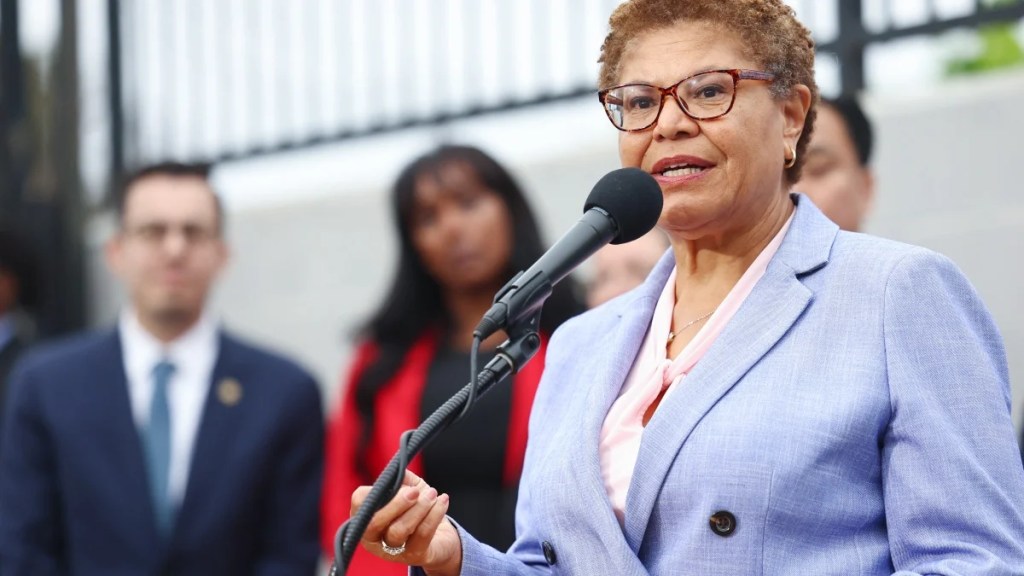Los Angeles Mayor Karen Bass launched a new Film and Television Task Force via executive directive Wednesday in hopes of streamlining the local production and permit process and slowing industry “leakage to other markets.”
The signed directive marked the first official order of business since assembling the mayor’s office inaugural Entertainment Industry Council in late July, which saw senior leaders across practices convene to work toward post-COVID and -strike production recovery in the city.
The new directive requires applicable city departments to designate Task Force staff, or “film liaisons,” to coordinate more efficient local production and permitting processes and to meet “quarterly to address production-related challenges and solutions directly with departments.”
“The entertainment industry is core to our economy, and it is also core to our city’s identity and City Hall is going to do everything we can to support it,” Bass said in a statement. “This executive directive is my pledge that the City is renewing its support for the entertainment industry and is expected to provide the highest level of customer service as we work to make sure that Hollywood stabilizes.”
Bass signed this directive into effect Wednesday ahead of her meeting at the Paris Olympics to continue preparation plans for the 2028 Games, which will be held in L.A.
Speaking to TheWrap, Deputy Mayor Rachel Freeman said the primary goal of the Entertainment Industry Council is to keep production local and further drive economic growth for not only Hollywood but the city economy at large.
Since Bass took office in 2022, Los Angeles has organized the permitting and inspection for seven new studios and soundstages to open on time and on-budget and an additional 8 million square feet of soundstage, studios and creative space are in the pipeline.
“[The entertainment industry] drives billions of dollars in local GDP annually. And it means jobs, high paying jobs for workers,” Freeman said. “It’s truly such a central part of our economic ecosystem here within the city, and it touches against so much more than just those that are directly tied to entertainment specific jobs.”
Freeman acknowledged that out-of-town markets like Atlanta and Toronto are becoming more attractive to production companies, but that L.A. wants to take back ownership of the business that built them.
“We know that other markets have been building up their competitiveness, whether it is through increased and enhanced tax incentive programs, or just building up sort of the local infrastructure and workforce,” Freeman noted. “It’s really important that the city of Los Angeles and our office take a leadership role here in ensuring that we’re keeping our signature industry here, and we’re keeping these jobs here and our production local.”
Local on-location fell 8.7% in the first quarter of 2024, TheWrap previously reported. And production cutbacks are being felt both domestically and internationally, with the number of U.S. productions shot down 40% from pre-strike numbers.
When asked about mergers, ongoing picketing and labor strikes, Freeman said that is not the primary focus of this committee.
“We are bringing leaders together through the Entertainment Industry Council to inform solutions that will help Hollywood better reflect Los Angeles workers and make sure that the City is an advocate rather than an impediment to local film and TV production,” Bass said. “Right now, our foundational industry needs the City’s support so we will be taking further action to help keep production local and help Hollywood stabilize. I look forward to all that we can accomplish together.”
The council features a lineup of a wide array of stakeholders and senior leaders from across the industry. Ellen Goldsmith-Vein, CEO/Founder, The Gotham Group, Netflix executive Amy Lemisch, filmmaker Jason Reitman and representatives from IATSE and NBCUniversal are among the members of the inaugural council.
Read more about Bass’ Film and TV Task Force here.
The post LA Mayor Karen Bass Launches Film and TV Task Force to Slow Production Leaving for Other Cities appeared first on TheWrap.





